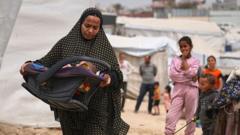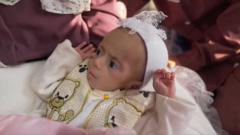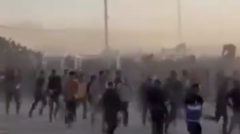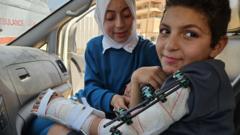As Gaza faces a humanitarian crisis exacerbated by war, expectant mothers like Malak Brees grapple with the fear of losing their unborn children due to malnutrition and inadequate medical support. The situation is made worse by ongoing military action, leading to complications during childbirth, increased stillbirth and miscarriage rates, and a lack of essential healthcare resources. Families are left in despair as they navigate the harsh realities of bringing new life into a conflict-stricken environment.
"Pregnancy Amidst Crisis: The Struggles of Women in Gaza"

"Pregnancy Amidst Crisis: The Struggles of Women in Gaza"
Amidst escalating violence and dire resource shortages, the challenges of pregnancy and childbirth in Gaza have intensified, leading to heartbreaking outcomes for mothers and infants.
Article Text:
In Gaza, where a horrific conflict rages on, pregnancy and childbirth have transformed into periods of heightened anxiety and dread. The war has severely impacted the health and survival chances of newborns and mothers alike. Amidst this turmoil, the United Nations reports that one in ten new babies is born underweight or prematurely, with increased incidences of miscarriages, stillbirths, and congenital defects.
At Nasser Hospital in Khan Younis, expectant mother Malak Brees, seven months pregnant, lives in constant fear of not only the airstrikes but also the potential for a premature birth. "I’m frightened that I could have a premature birth at any time and that my amniotic fluid isn't enough for the baby to grow in,” she shared, reflecting the anxiety that many pregnant women feel.
The relentless Israeli blockade that began in March has exacerbated existing health challenges, significantly reducing access to medical supplies, nutrition, and hygiene products. Many women are forced to give birth in unsafe conditions, outside hospitals, and at times, without medical supervision. US emergency nurse Sandra Adler Killen observed that mothers discharged from hospitals too soon often do so with babies who require urgent care rather than being monitored properly.
While the Nasser Hospital’s neonatal intensive care unit remains operational, it is overwhelmed, especially after a nearby hospital was bombed, further taxing an already strained healthcare system. The continuous assaults on medical facilities make pre-natal care unattainable for a majority of the estimated 55,000 pregnant women in Gaza. "The psychological state of the women...may God help them," noted Dr. Ahmad al-Farra, highlighting the deep-seated fears these mothers face during childbirth.
As food insecurity deepens, many mothers struggle with breastfeeding due to their own poor health or lack of nutritious food, leaving organizations like the Gaza Infant Nutrition Alliance to step in to support local medical staff and mothers. The difficult environment often leads to desperate situations — mothers are seen pleading for help, their emotional pain palpable as they fight to nourish their children.
Ayah al-Skafi faced the ultimate tragedy when her daughter, Jenan, succumbed to malnutrition after a failure to access necessary formula. Reflecting on her loss, she expressed the futility of her situation: "I begged for help but only God... answered."
Sandra Adler Killen's experiences of supporting mothers remotely reveal a growing despair within the community. The constant threat of violence erodes the traditional family support systems, making it increasingly challenging for mothers to cope with the demands of caring for their newborns.
The tragic aftermath of the conflict was demonstrated when Jomana Arafa, a mother who had just given birth to twins, was killed three days later in an Israeli strike. Her husband’s devastation is a stark reminder of the dangers mothers face, as the joyful anticipation of new life has turned into a fight for survival.
In Gaza, once filled with hopes and dreams for the future, pregnancy and childbirth have transformed into a landscape of fear and loss, highlighting the dire need for humanitarian aid and support for women amidst this relentless crisis.
In Gaza, where a horrific conflict rages on, pregnancy and childbirth have transformed into periods of heightened anxiety and dread. The war has severely impacted the health and survival chances of newborns and mothers alike. Amidst this turmoil, the United Nations reports that one in ten new babies is born underweight or prematurely, with increased incidences of miscarriages, stillbirths, and congenital defects.
At Nasser Hospital in Khan Younis, expectant mother Malak Brees, seven months pregnant, lives in constant fear of not only the airstrikes but also the potential for a premature birth. "I’m frightened that I could have a premature birth at any time and that my amniotic fluid isn't enough for the baby to grow in,” she shared, reflecting the anxiety that many pregnant women feel.
The relentless Israeli blockade that began in March has exacerbated existing health challenges, significantly reducing access to medical supplies, nutrition, and hygiene products. Many women are forced to give birth in unsafe conditions, outside hospitals, and at times, without medical supervision. US emergency nurse Sandra Adler Killen observed that mothers discharged from hospitals too soon often do so with babies who require urgent care rather than being monitored properly.
While the Nasser Hospital’s neonatal intensive care unit remains operational, it is overwhelmed, especially after a nearby hospital was bombed, further taxing an already strained healthcare system. The continuous assaults on medical facilities make pre-natal care unattainable for a majority of the estimated 55,000 pregnant women in Gaza. "The psychological state of the women...may God help them," noted Dr. Ahmad al-Farra, highlighting the deep-seated fears these mothers face during childbirth.
As food insecurity deepens, many mothers struggle with breastfeeding due to their own poor health or lack of nutritious food, leaving organizations like the Gaza Infant Nutrition Alliance to step in to support local medical staff and mothers. The difficult environment often leads to desperate situations — mothers are seen pleading for help, their emotional pain palpable as they fight to nourish their children.
Ayah al-Skafi faced the ultimate tragedy when her daughter, Jenan, succumbed to malnutrition after a failure to access necessary formula. Reflecting on her loss, she expressed the futility of her situation: "I begged for help but only God... answered."
Sandra Adler Killen's experiences of supporting mothers remotely reveal a growing despair within the community. The constant threat of violence erodes the traditional family support systems, making it increasingly challenging for mothers to cope with the demands of caring for their newborns.
The tragic aftermath of the conflict was demonstrated when Jomana Arafa, a mother who had just given birth to twins, was killed three days later in an Israeli strike. Her husband’s devastation is a stark reminder of the dangers mothers face, as the joyful anticipation of new life has turned into a fight for survival.
In Gaza, once filled with hopes and dreams for the future, pregnancy and childbirth have transformed into a landscape of fear and loss, highlighting the dire need for humanitarian aid and support for women amidst this relentless crisis.





















